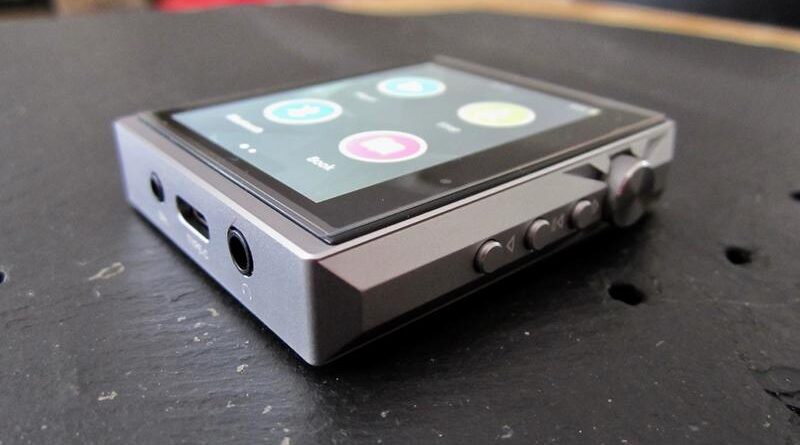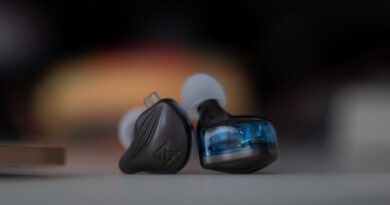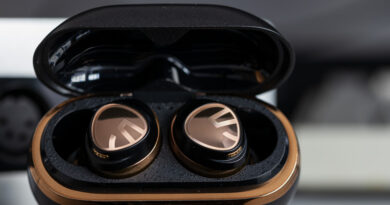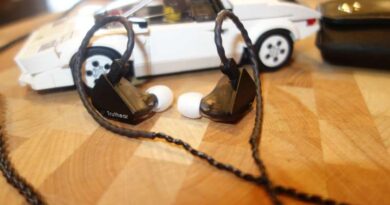Hidizs AP80 Pro-X Review (1) – Back In the ESS R
Pros — Single-ended and balanced circuits; dynamic neutral, engaging sound; quality build; flexible OS.
Cons — Outdated Bluetooth 4.1; short battery life; no onboard storage for key files, no (more) radio; no case.
In this Article
Executive Summary
The Hidizs AP80 Pro-X is a versatile and enjoyable dap with a proven SoC sound that probably offers excellent value at its $180 price tag.
Introduction
Hidizs is an up and coming company out of China that recently scored hits with their S9, S3 Pro and particularly their S9 Pro dongle DAC/amps. The latter is one of the most popular dongles in the overcrowded $100-150 class. My review made it into the upper third of our Top 20 most read reviews of 2021. Hidizs also focus on portable music players, bluetooth receivers, and earphones, such as the MS1 Rainbow. The AP80 Pro-X is their latest DAP.
Specifications
The ouput impedance is < 1 ohm…
| Master Chip | Ingenic X1000 | |
| All-in-one DAC/amp Chip | ES9219C x2 | |
| OS | HiBy 3.0 | |
| Single-ended Headphone Output | ||
| Rated output power | 70mW+70mW@32Ω | |
| Frequency response (±3db) | 20-90kHz | |
| THD+N | 0.0015 | |
| Dynamic Range | 115dB | |
| S/N ratio | 119dB | |
| Channel separation/Crosstalk rejection | 110dB | |
| Balanced Headphone Output | ||
| Rated Output Power | 190mW + 190mW@32Ω | |
| Frequency response (±3db) | 20-90kHz | |
| THD+N | 0.0015 | |
| Dynamic Range | 116dB | |
| S/N ratio | 120dB | |
| Channel separation/Crosstalk rejection | 117dB | |
| Purchase Link: Hidizs.net |
Differences between Hidizs AP80 Pro and Pro-X
Compared with AP80 PRO using the final unfold (4X) of an MQA file, AP80 PRO X will use MQA technology for the final unfold (8X) of an MQA file.
The AP80 Pro-X is the update of the AP80 Pro. The main tech difference between the two is the chipset. The AP80 deploys two ESS ES9218P SoCs (introduced in late 2016; “System on Chip”), and the AP80 Pro-X features two ESS ES9219C SoCs (introduced in late 2019).
Both all-in-one DAC/amp chips have effectively the same specs, but the ES2919C features hardware-level MQA decoding and it has a lower battery consumption at standby/no load.
This results in essentially the same performance specifications between AP80 Pro and AP80 Pro-X with channel separation as apparent exemption. Hidizs lists a much improved channel separation for the AP80 Pro-X model. Upon further inspection, the AP80 Pro-X’s better value stems from a measurement at no load, whereas the AP80 Pro’s number was generated under load.
And since channel separation decreases with load, these two numbers cannot be compared. But even the AP80 Pro’s “worse number” is still very good. I speculate both models’ channel separation are identical.
Functional difference is a lack of radio and protective case, and a different shape in the AP80 Pro-X (the AP80 Pro’s case does not fit).
Not changed between models have operating system, buttons/potentiometer, and Samsung touchscreen.
In summary, although I have not auditioned the AP80 Pro, I do not expect any (significant) sonic differences between the two. In fact, there should not be any major difference between any model using these SoCs, as the engineer cannot manipulate the software (in contrast to a dedicated DAC chip). In other words, the sound is entirely made by ESS and not by Hidizs or whoever put their name on the dap.
| The Hidizs AP 80 Pro and Pro-X have identical performance specs in terms of output power, frequency response, THD, dynamic range, and S/N ratio for both single-ended and balanced circuits (without MQA involved). |
Design, Build quality
Physical Things and Usability
IN THE BOX…
- Type-C cable
- Type-C to Type-C OTG cable
- User manual
- 2 Screen protectors
- Warranty card
The design is an aluminum chassis sandwiched between two sheets of glass. Not sure whether I did it right, but I used one of the screen protectors in the front, and the other in the back :). The square shape is a bit odd to get used to, and the small size is traded for battery size.
The Samsung screen is responsive and of good resolution. The buttons are precise and the Japanese ALPS potentiometer is suspended. The overall build is very good. The AP80 Pro-X does not come with a protective shell, and there is currently no after-market one available.
Functionality and Operation
What it does
- plays music through single-ended and balanced headphone circuits
- works as wired DAC with computer and cellphones
- features bi-directional Bluetooth 4.1
- offers unique sound adjustments through “MSEB”
- accepts micro SD card up to 512 mB
- updates its music library blistering fast
- lets you read ebooks
- counts your footsteps (pedometer)
What it does not
- play single-ended and balanced circuits simultaneously
- does not feature the latest Bluetooth standard
- have radio function anymore (lost with chip upgrade from AP80 Pro model)
- has no accessible onboard storage for key files
- have the greatest battery life between charges
- no case available (at the time of writing)
Handling, Software, operating system/user interface, sound settings, connection options and modes, internals, pairing/Bluetooth, updating the library…fast or slow…




HiBy 3.0 OS
HiBy is a company that produces their own daps, but they started out as software designers. Their OS 3.0 is therefore a mature product that I learnt intuitively and quickly by trial and error. No manual needed.
Compared to other OS, the HIBy has a few special features, such as pedometer and ebook reader. Two-directional Bluetooth may be more common. It can also be used as DAC with your computer or phone/tablet.

Unique to HiBy OS is the MSEB, which stands for “Mage Sound 8-ball”. It is a parametric, very intuitive EQ. The OS also includes a standard EQ. Other remarkable features of the HiBy OS are low/high gain selection, crossfade, and antialiasing in the play settings.
Amplification and Battery Consumption
Hidizs states 6-8 hrs playtime balanced and 8-11 h single ended, with a 40-day standby. That’s not great considering the iPod Classic’s 36 h playtime and is a function of the AP80 Pro-X’s small form factor (which does not leave space for a larger battery). But you are compensated with a fast 1h recharging.
Most of my power-hungry headphones are single-ended and the AP80 Pro-X had plenty of juice left with the 150 ohm Sennheiser HD 25. The single-ended output also handles the demanding planar-magnetic KBEAR TRI3 Pro with ease so that the more powerful balanced circuit probably plays any iem you throw at it.
DAC Use with Computer
Using the AP80 Pro-X as a “dongle DAC” with my MacBook Air worked very well, too. Particularly, the balanced circuit provides lots of power. When connected, the AP80 Pro-X’s battery is charging during use. Sound quality wise, it corresponds to a $120-150 dongle such as the Hidizs S9 Pro (I actually prefer the AP80 Pro-X’s sound). I was pleasantly surprised overall.
As dac compared to Cobalt: Cobalt sounds more natural with more depth/more 3D….and bassier WITH BETTER SEPARATION…and dynamics…HIDIZS SOUNDS FLATTER, less separation…much less depth…much less 3D..not even with bigger headroom…but AP80 is more powerful…
Sound
Equipment used: Sennheiser HD 25, KBEAR TRI3 Pro, Final E3000, IKKO OH10.
The AP80 Pro-X has its sound dictated by its prefabricated SoC. It will sound very similar to other devices using the same all-in-one chip. The presentation is neutral without being analytical or edgy. Nothing is boosted, which results in great midrange clarity. Staging is wide with good depth resulting in a decent headroom even with the single-ended circuit. Dynamics is great, the image is vivid. It also has good intimacy.
The single-ended output is good, but the balanced circuit is the star providing superb clarity and headroom…and a truly impressive listening experience. The clarity is adherent to the lack of USB noise in a dap – compared to a phone full of non-audio components. I find the overall sound better than that of my iPhone SE (1st gen.) with the Hidizs S9 Pro dongle.
Amazing what you get for $180 compared to iems at this price.
Hidizs recommends headphones/earphones between 8 and 200 ohm to be used with the AP80 Pro-X. It harmonizes perfectly well with the 150 ohm Sennheiser HD 25 (single ended circuit, high gain) doing justice to the headphone’s punchiness and dynamics. Lots of headroom.
Stepping over the upper limit with the 300 ohm Sennheiser HD 600, the headphone lost is smoothness and richness and became edgy sounding, while still playing loud enough.

Hidizs AP80 Pro-X Compared
Two candidates for comparison are the $109 Shanling M0 and the $220 Sony NW-A55.

The Shanling M0 features the same SoC as the original Hidizs AP80 Pro and sounds very similar to the “single-ended” AP80 Pro-X, too (I don’t have MQA). The Pro-X has bigger staging and more intimacy. But its balanced circuit with its much bigger headroom and dynamics removed any doubt and puts the Shanling to shame.
The Sony NW-A55 only features a single-ended circuit and sounds somewhat smoother and richer in the midrange, in comparison to the more brittle AP Pro-X. And it has a far superior battery life of >>20h owing to its larger size/bigger battery. The Sony can also be customized with Mr. Walkman firmware tailor the sound to the user’s particular taste.
Concluding Remarks
The Hidizs AP80 Pro-X is a versatile and competent dap with proven technology that provides me with lots of pleasure. Particularly its balanced circuit is impressive. As a DAC, it probably beats most budget dongles imo – including the Hidizs S9 Pro. The AP 80 Pro-X sits well in its price category – you probably cannot do better below $200 – which is a sweet spot for many.
Until next time…keep on listening!

Disclaimer
The Hidizs AP80 Pro-X was provided unsolicited by Hidizs. You can buy it here: Hidizs.net. This is not an affiliate link.
Coupon Codes
AUDIOREVIEWS5 5% off for AP80/AP80 Pro//AP80 Pro-X/(DH80s/80)/MS2/MS4/S9 Pro/MS1/H2 and bundles
AUDIOREVIEWS3 3% off for S8/MS1 rainbow/Seeds/H1/BT01
Our generic standard disclaimer.
You find an INDEX of our most relevant technical articles HERE.


Gallery








